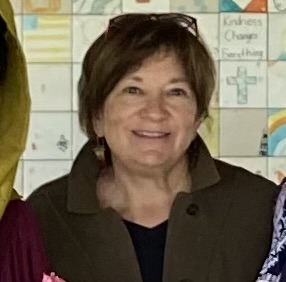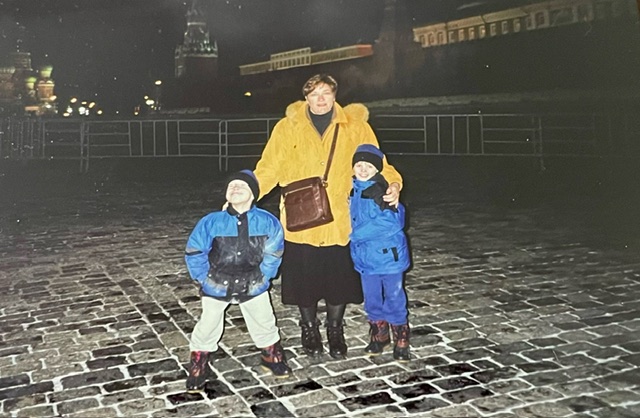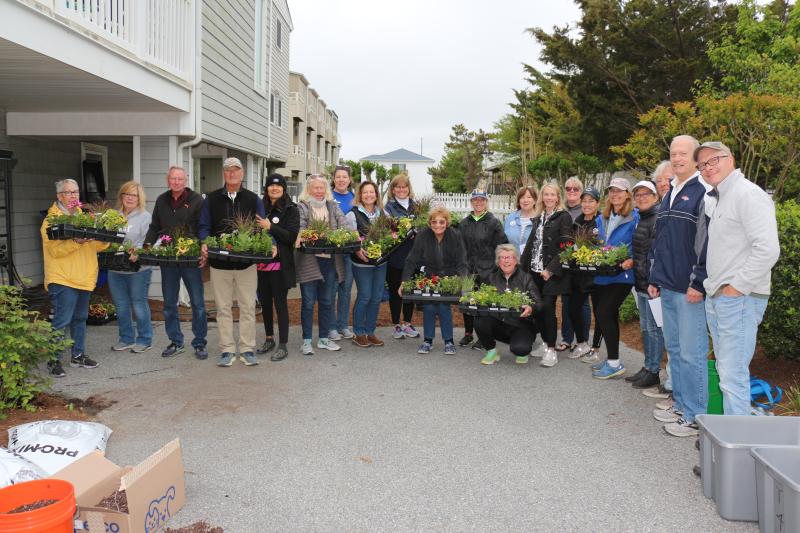Patrice Gancie: A life well spent serving others
Making the world a better place for others comes naturally to Patrice Gancie.
The descendant of Sicilian immigrants, she feels a strong connection to families seeking to transform their lives in the U.S.
“I was their first grandchild, and I saw how hard they worked,” Gancie said. “It shaped my views about what I want to do in life, and that’s to help people.”
The Brooklyn, N.Y. native moved with her family to the Washington, D.C., suburbs when she was 7. Like many of her Capital City neighbors, she’s vacationed in Dewey and Rehoboth since childhood.
After earning a broadcast journalism degree at American University, she never worked a day in the newsroom.
“I figured a degree in journalism would be more practical than English literature,” she said, chuckling.
During the height of anti-Vietnam war protests, Gancie covered student government for the college newspaper.
“It spurred me on,” she said. “When you talk about a university being a space to broaden your impact on life, it was certainly the time and place to do it.”
While she never appeared in front of the camera, she has since carried out her best work behind the spotlight, working in service for others, first at the National Education Association headquarters, and Maryland and Virginia affiliates.
At the NEA, she focused on community outreach and crisis communications campaigns, using her journalistic skills to create newsletters and specialty publications.
“It was another volatile time,” she said. “I could see how emotional educational issues can be for teachers and parents.”
When Gancie’s husband Randy Bregman, a managing partner in a D.C. law firm, was given the opportunity to open a Moscow office, the couple set off for Martha’s Vineyard in August 1991 before moving to the Soviet Union.
About the same time, near the Bahamas, a storm was forming in an area of low pressure. Strengthening into a hurricane as it brushed past North Carolina’s Outer Banks, it slammed into New England as Category 2 Hurricane Bob and dropped a boat in their vacation home’s front yard.
During the storm, they received a call from Bregman’s firm.
“They said the move to Moscow might not happen because there was a coup,” she said. “[Soviet President Mikhail] Gorbachev is out and a new system is taking over.”
While the Communist coup was unsuccessful, it weakened Gorbachev’s power. Gancie and Bregman made the trip overseas and just four months later, Gorbachev resigned, leaving Boris Yeltsin as president of the new Russian state.
The abrupt and chaotic transfer of power led to tight government control, Gancie said, with restrictions on where, when and with whom people could move about.
For her first Thanksgiving in Moscow, Gancie figured she could pick up a turkey at a local market.
“The stores were horrible; there was no food, and lines of people,” she said, noting the U.S. Embassy subsequently provided turkeys to Americans for their holiday meals.
It didn’t take Gancie long to see the extensive expatriate community could benefit from organized resources. She founded a Russian-American cultural center that offered tours, language classes, and arts exhibitions for Americans overseas.
When the time came to move back to D.C. five years later, the now Russian-speaking Gancie had to be dragged out kicking and screaming.
“Once back home, I realized how much I had gotten into the culture of negotiating as a way in and out of every situation by paying someone or talking them into it,” she said with a chuckle.
Not long after, the opportunity arose to foster two Russian brothers, ages 6 and 8, through an international adoption agency in hopes the children would meet an adoptive family during their several-weeks stay.
“We decided to adopt them,” she said, and Artyom and Roman became part of the family in 1998. Now 32 and 34, they live and work in D.C.
The experience led Gancie to volunteer with, and later serve as 15-year director of, Cradle of Hope Adoption Center’s Bridge of Hope hosting program. The agency brought older children from foreign orphanages to stay with American hosts and meet potential adoptive parents.
“We eventually brought more than 700 kids from Russia, China, Ukraine and Colombia, and had a 90% [adoption] success rate,” she said. “It was very fulfilling. I still marvel at the bravery of those kids.”
Later, governments came to prefer keeping children within their own countries and cultures, she said, making it difficult for adoption agencies to operate. Russian President Vladimir Putin’s ascent to power closed the door for those kids, she said, and many Americans had wanted to foster or adopt Ukrainian children.
“The world took over, and the war interrupted,” she said. “It’s heartbreaking.”
After retiring in 2018, Gancie found a new mission with Lutheran Social Services of the National Capital Area, first as an ESL teacher and later on the board.
The organization isn’t focused on religion, she said, but on providing support services and resources for immigrants and refugees rebuilding their lives in the greater D.C. area.
“I knew I wanted to work with refugees,” she said, noting she has helped set up homes for newly arrived families seeking safety and stability. “It was such an incredibly moving experience. Immigrants come here for a better life for their families, and this organization works so well for these people.”
After many years hopping into the car for day trips at the beach, Gancie and Bregman bought their Jersey Street home in 2017 from Realtor and former Dewey Mayor TJ Redefer.
“I loved him,” she said. “He was so happy to help fulfill my lifelong dream. After the settlement, we walked to the beach and I just burst into tears. I was so happy we accomplished that.”
Being a part-time resident made it difficult for the community organizer she is to fully immerse herself within local projects, but she found a home on the town marketing committee. When a neighbor asked her if it might be possible to launch a Dewey in Bloom like the Rehoboth and Lewes organizations, she took it to the committee.
“It all came together in just a few months and the plants look great,” she said, noting the group leaned heavily on Rehoboth in Bloom for advice on growing the new program.
All of the Dewey in Bloom volunteers have been integral to its success, she said, including the steering committee, donors, sponsors and especially the gardeners who dedicate time each week during the blooming season and beyond to plant, prune, weed and water more than two dozen planters throughout town.
Volunteers will gather Sunday, Oct. 13, to dig up summer flowers and plant winter pansies, and the group is looking to expand with a potential children’s learning garden, community herb garden and more bloom boxes. To get involved, go to townofdeweybeach.com/departments/deweyinbloom.
Taking the initiative to beautify Dewey Beach is just another way Gancie works to improve lives for everyone in the world within her reach.

























































